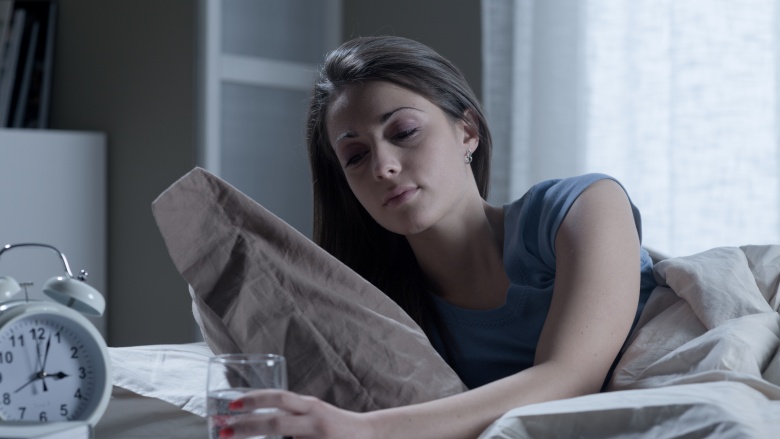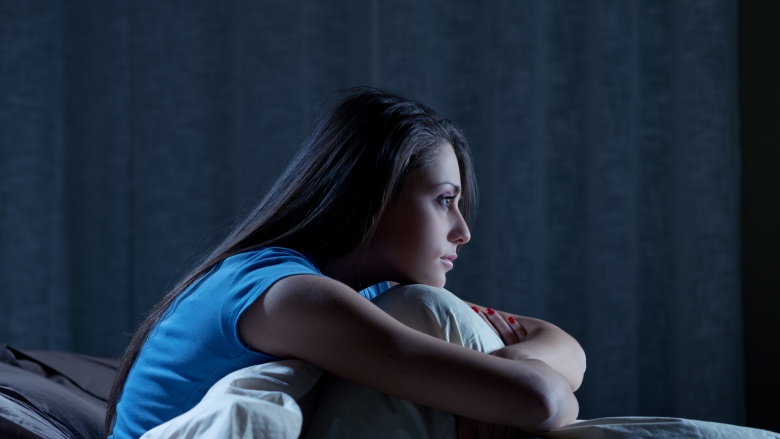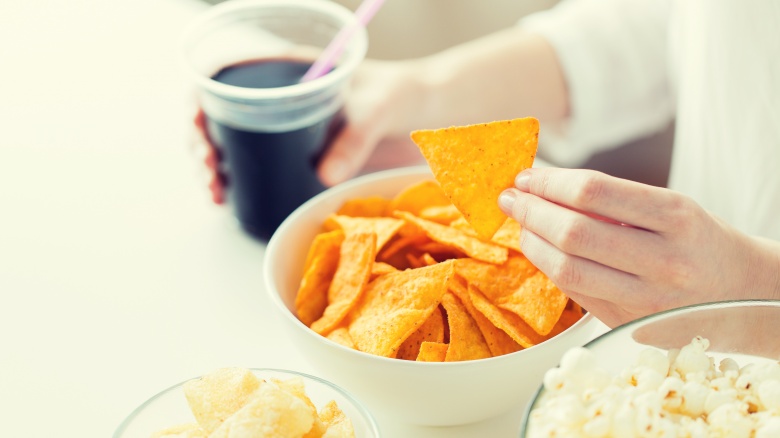The Real Reason You Should Stop Eating Late At Night
It's 1 a.m. and you're staring into the refrigerator while your stomach groans in hunger. You knew you'd find yourself there after skipping dinner yet again. Cursing yourself, you push aside that healthy bowl of fruit and reach for some leftover pasta instead. It's been a long week. You deserve it, right?
We've all been there. Tired, stressed, and hungry, reaching for anything in sight to calm our desperate bellies. And while giving in to an occasional late-night meal is nothing to beat yourself up about, making this a habit may not be a great idea.
According to one study published by the Proceedings of the National Academy of Sciences journal, consuming food late at night can disrupt our sleep cycles, which could ultimately have negative health impacts, including weight gain.
"When we eat late at night, it can throw off our body's natural rhythm and prevent our bodies from being able to fully prepare for a restful sleep," Dr. Partha Nandi M.D., F.A.C.P, and creator and host of the Emmy-award winning medical lifestyle TV show Ask Dr. Nandi tells The List.
Here are a few more reasons to kick your late-night eating habits.
It can lead to GERD
If you've ever laid down immediately after a large meal, chances are you've felt the wrath of an upset stomach. Needless to say, it's not pretty. When you eat late at night, particularly if it's a large meal, it may increase your chances for gastroesophageal reflux disease, or GERD, a digestive disorder where stomach acid or bile irritates the food pipe lining, causing the pain and discomfort we know as heartburn. "Your stomach's acidic levels reach a lower than normal production by around 8-10 p.m.," Dr. Aditi G. Jha, MD, a general physician and head medical panel member at JustDoc, tells us. "This new level of acid now becomes the problem when you eat snacks or heavy meals, since it is not enough to then digest the complex foods." In some cases, this can cause food to regurgitate up your esophagus and irritate your food pipe, as well as cause gas and bloating.
It can induce night sweats
Heartburn and indigestion aren't the only ways that late-night eating can disrupt a good night's sleep. In fact, according to an article published by Harvard Medical School, eating a large meal, especially a heavy one like a burger or pizza, close to bedtime, can induce night sweats "because the body generates heat as it metabolizes the food."
"It takes lots of energy to digest a meal, especially a large meal," Maria Sorbara Mora, a registered dietician and co-founder of Nutrition and Yoga Services at Aurora Behavioral Health in New York City, explains to us. This is especially true late at night when organs are moving at a slower rate, including during digestion. "Proteins and fats can take much longer and illicit more energy to digest," she says.
Something to think about the next time you're hitting up the drive-thru at 2 a.m.
Oh, the insomnia
When meals are large and eaten too late, digestion can be very stalled and lead to uncomfortable side effects. "This discomfort may end with us waking up," Rebecca Lewis, in-house dietitian at HelloFresh, tells us.
So does this mean we're better off going to bed hungry if we didn't get around to having dinner at a reasonable hour? Well, not necessarily. While late-night eating can keep you up with things like heartburn and indigestion, going to sleep hungry can be just as problematic. "Most of the time going to bed on an empty stomach will have a greater affect on sleep than going to bed on a full stomach," Lewis explains. "If you are hungry when you try to fall asleep, your brain will end up being too alert. This is because when our bodies sense we are low on fuel, it will release cortisol to wake us up from sleep to go seek out food (thus the consistent 3 a.m wake up call from your brain)."
The bottom line: neither extreme (eating too little or too much) is going to be good.
We tend to make unhealthy choices late at night
Turning away that side of french fries at lunch might not be so hard, but come midnight, these warm, salty pieces of heaven are hard to resist, especially after a night out drinking. "We tend to go for late-night treats such as ice cream, pastries,and salty chips, all of which are calorie dense and can promote weight gain in the long run," says Dr. Nandi. He also explains to us that late-night eating can affect the ghrelin hormone, which increases appetite and plays a role in body weight. "This hormone uses the naturally occurring break (between 8 p.m. and 8 a.m.) to reset itself, but if you eat too late at night you are not giving your body enough time to do this. This can actually make you hungrier in the day following your late night indulging and can also affect your memory and lead to difficulty concentrating."
Unhealthy choices often lead to more unhealthy choices
It happens. One late-night burger and fries on a Saturday quickly leads to pizza on Sunday followed by Chinese take-out on Monday. Suddenly, it's 1 a.m. on a Wednesday and we're midway through a slice of cheesecake wondering where we went wrong. It's a vicious cycle that's even harder to break when we're not getting the sleep we need because, well, we're eating late at night and our bodies are paying the price. "For sleep to occur the brain needs to make adequate melatonin and serotonin," explains Mora. "When the brain does not produce enough, cravings for sweets and carbs occur, especially in the evening when this hormone is needed most." It's our body's way of habitually trying to create chemical balance.
It's not so much when you eat, but what you eat
We get it. Sometimes we work late. Some of us have school deadlines to meet. Life isn't perfect, and at some point, we'll all be staring down the refrigerator at 2 a.m. looking for something to satisfy our growling stomachs. We can't always control it. However, we can control the choices we make.
"If you can't avoid those late-night snacks, stick to healthy whole foods such as fruits, vegetables, and whole grains, which are easier to digest and low in calories," suggests Dr. Nandi.
Lewis also recommends avoiding alcohol and caffeine before bed as they can both become stimulants in the brain, causing us to have much less restful sleep. "When we're trying to slow down and relax, the last thing we need is a stimulant racing through our system," she tells us.
Keep it light at night
Besides opting for things like whole fruits and veggies at night, Dr. Nandi suggests keeping late-night snacks as small as possible. Instead of eating a heavy meal at night, he recommends "eating six nutrient-dense small meals per day for sustained energy and appetite control." He also explains that "restricting your food intake during the day can lead to cravings and unhealthy late-night snacking."
Mindful eating is healthy eating
For many of us, late-night eating is not always set off by actual hunger, but rather stress, anxiety, or other emotions. "Being 'stomach hungry' means you need to feed a growling stomach. This would be triggered by hunger and indicates you are low on energy," explains Lewis. "However, being 'emotionally hungry' means you may be feeding a feeling triggered by emotions which may indicate you are bored, sad, depressed, or even excited." Lewis suggests paying attention to why we're eating as carefully as we pay attention to what we're eating. "In general, mindful eating balances how you eat with what you eat," she tells us. "It's really all about awareness, checking in, and being mindful of the choices we make. Maintaining weight really is all about the small everyday choices."








